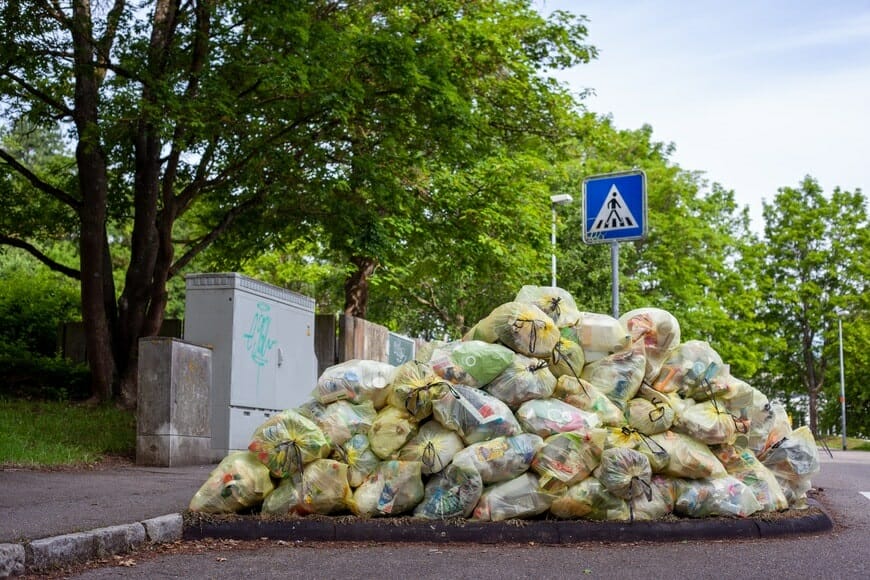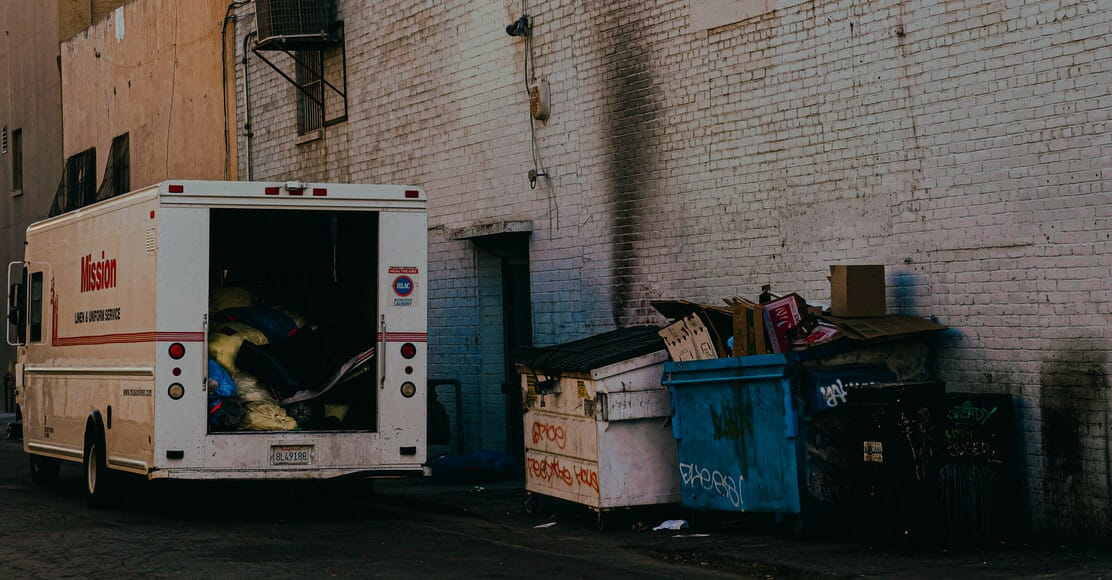- BY Evelyn
- POSTED IN Dumpster Rental
- WITH 0 COMMENTS
- PERMALINK
- STANDARD POST TYPE
Dumpster diving used to be considered something people only did when desperate or in need. However, it has become much more than this. For freegans, it is an essential part of their lifestyle and philosophy. There are even people who classify themselves as “professional” dumpster divers and make a significant income from their finds. YouTube is packed with videos of enthusiastic divers finding real treasure troves in other people’s trash, with one woman finding over $490 worth of goods when checking out the trash at a local store. Getting into dumpster diving is quite easy, but it’s first important to investigate the legalities of such a pastime. Is it really legal? Also, how can you dumpster dive safely?
EWM Dumpster Rental offers effective junk hauling services to customers in Barclay, Maryland and the 21607 ZIP code used in this part of Queen Anne’s County.
Understanding the Laws around Trash
Many people think of dumpster diving as not hurting anyone. You are essentially getting something from other people’s trash, so if they didn’t want it, what’s the big deal? While this is true so far as it goes, there are also laws to keep in mind. Consideration for others is central to dumpster diving in a respectful and law-abiding way. So let’s look a little more closely at the relevant legislation for dumpster divers.

Look out for Local “Garbage Ordinances”
Technically speaking, dumpster diving is legal in all the states of America. In 1998 the case of the State of California vs Greenwood went to the Supreme Court and clarified the issue. The court ruled that searching in the trash is legal as long as it does not conflict with any state, county or city ordinances. This translates as once your trash hits the curb, waiting for the waste disposal truck, it becomes “public domain.” This means the Fourth Amendment no longer applies, and the trash is now free to be searched or taken by practically anybody from the police to neighbors to budding dumpster divers.
Each city has its own specifics, and you need to be aware of your state’s laws. Ordinances can easily be searched on most local county and city websites so you can check whether the act of dumpster diving is possible and legal before you start. Dumpster diving laws can be found at all levels, so it is important to check carefully from federal to state law and county and city law, depending on your area. You may also need to look at business-specific laws, as many of the biggest opportunities to find real value in dumpster diving come from retail and restaurant sites.

It is always illegal to take anything from private property.
Trespassing Laws
If you jump over a fence, go through a gate or enter private property in any way, then you may be trespassing. Unfortunately, many stores and restaurants have gated off back areas, meaning their dumpsters are off limits and cannot be legally searched. If the trash is out on a public street, then trespassing laws do not apply.
Signage and Locks on Dumpsters
Some dumpsters are equipped with bold signage warning divers away. This counts as appropriate precautions to keep people away from the trash, even if it is on public land. Any dumpster with a sign or lock is much harder to access and could constitute criminal damage if you break in. Some signs and regulations can be used in court to prove appropriate action was taken to keep divers away.

Disorderly Conduct and Attracting Attention
Dumpster diving is often a social activity and can be fun with a group of friends or like-minded people. However, it may be viewed as disorderly conduct if the public makes any complaints or the police are called. Law enforcement officers can and often will issue a ticket or warning if you do anything deemed inappropriate in public.
Similarly, using a vehicle to collect goods from a dumpster can attract attention and cause worry. Bystanders may think you are stealing and may call the police to report theft, especially if high value items are found in the dumpster. Therefore, you need to be prepared and know the law whilst remaining respectful should you need to report to the police.
Dumpster diving is usually legal, provided you’ve checked local laws. However, it would be best if you kept in mind that it isn’t necessarily looked on favorably by business owners or local residents.
Why is Dumpster Diving Popular?
There are many reasons people enjoy this pastime. It can be a great way of saving money and some people even generate a profit. Others are committed to a simpler way of life and want to minimize their input into the economy and contribution to capitalism. In addition, dumpster diving is often seen as going green and reducing waste, as items that were going to landfill can now be reused.
Dumpster diving can generate an income for some people. One of the most successful dumpster divers, Matt Malone, makes more per hour from his dives than from his full-time career. The money each person makes from their dumpster finds will depend on their work ethic and knowing what to look for. Scrap metal is one of the most common ways of making money from trash, as you can sell it to recycling centers. Even electrical products such as broken hairdryers and TVs have metals within them, such as copper coils, and these can be sold on. Similarly, items that appear broken to you may sell well on a local or online market, so it is worth seeing what return you can get from each of your finds.
Dumpster Diving as a Political Act
While many people enjoy the benefits of a bargain through dumpster diving, it can be part of a fervent political stance. Many activists involved in environmentalism are particularly committed to dumpster diving due to the volumes of perfectly edible food wasted each year. One hundred and eight billion pounds of food is wasted in the United States each year. This is something many people feel strongly about. Their commitment to dumpster diving is about showing just how much food is wasted and limiting their contribution to the bank accounts of the large organizations they believe to be responsible for the problem.
The Freegan movement also offers an alternative philosophy for living that relies upon “rescuing” items from others’ trash. Their aim is to keep their interactions with capitalism to a minimum, including reducing their consumption of what they label as “capitalistic resources”. This makes dumpster diving vital to their way of living, and it helps to keep the movement sustainable.
Whatever your reasons for giving dumpster diving a go, it’s important to ensure you are properly ready and know where to begin.

Practical Tips for Wannabe Dumpster Divers
If you are interested in dumpster diving, then it’s important to do it properly and always keep safety in mind. It can be very dangerous if not carried out properly, and you risk cuts and other injuries as it isn’t always possible to know what’s inside a dumpster before you dive in. Some basic tips to keep in mind include:
- Take time to research and understand when the trash is picked up and properly plan your dives.
- Remember you are 100% responsible for any injuries or illnesses resulting from your dumpster diving activities.
- Choose the right time of day to dumpster dive – late afternoon into evening is often best as you are not in full daylight.
- Learn the peak times to dive – curb-side pickups are particularly fruitful just before Christmas, as people often get rid of their old things to replace them with new ones.
Etiquette for Dumpster Divers
While you are rooting around in the trash, it is important to consider the feelings of others. When dumpster diving, the key things to remember include keeping things tidy and not ripping open any trash bags unless you’re searching and then resealing or providing another bag. Always ensure the dumpster and surrounding area is in the same, if not better, condition as when you found it.
The employees of the store or restaurant will be responsible for cleaning up around the dumpster, and you don’t want to make their work even harder. Even if you have animosity or a political stance against large organizations, their employees are not to blame.
It is also important to think about other dumpster divers, and if you find a real treasure trove, consider only taking what you really want or need.
It is also important to prove you are properly prepared.
Clothing and Equipment for Dumpster Diving
Dumpster diving attire and equipment should make each trip out as safe and convenient as possible. Your oldest coveralls are your best bet or, at an absolute minimum, long pants and a long-sleeved top. Closed-toe footwear is also essential to avoid the risk of cuts and puncture wounds. Protective clothing such as masks and heavy-duty gloves are also a good idea to minimize the risk of contamination and further injuries.
It is also sensible to have the right equipment on hand to further improve the chances of a successful dive. Useful items include:
- A crate or sturdy box makes accessing the dumpsters as easy as possible.
- Storage bags or containers so you can stash anything you find right away.
- Head lamp or flashlight if you’re choosing to go out at night.
- A roll of tape so you can reseal any bags you open.
- Hand sanitizer and wipes so you can keep yourself clean on the go.
- Transportation so you can avoid taking your finds home on the bus.
Planning in advance also involves deciding where you plan to dive. You can map out a route alongside recognized high streets and populous areas where there are lots of shops and restaurants. If you are looking for a particular product or item, you can research locations that sell this item and see if their dumpsters reveal any treasure. Some dumpster divers do go to this level of planning, and it usually reaps rewards.
Staying Safe
We’ve explained that dumpster diving can be dangerous. However, these dangers are much more of a risk if you do not plan. Taking the right precautions is vital in minimizing the risk of danger. The main hazards to look out for are:
Sharp objects: trash cans and dumpsters are made for getting rid of broken goods, so don’t be surprised when you find them. Be sure to look out for sharp blades and broken glass to avoid getting cut or injured.
Windy weather: make sure the lid of any dumpster you climb inside is secured properly. When winds are high, lids can easily blow shut, and can be difficult to lift. As a result, you could be trapped for hours and only be discovered when the trash is next emptied.
Medical and hazardous waste: do not ever consider dumpster diving in a medical trash dumpster. Medical and chemical waste can have a serious impact on your health, and you could find yourself in contact with contaminated needles and other dangerous hazardous materials.
It is also important to consider the time of day. While late at night is often the best time to dive for trash, you need to keep your safety in mind too.
One man’s trash is another man’s treasure
If you know where to look and you know what you’re looking for, dumpster diving can be a hugely profitable pastime. On the other hand, some people enjoy doing it for the thrill of the find and the amazing surprises they encounter as they explore different types of dumpsters in different neighborhoods.
While most people are not able to make a living from their dumpster finds, many people successfully cut their grocery bills or benefit from the proceeds of selling goods they’ve found in the trash. Finding the balance between safety, respect and finding the finest treasures out there may take some time, but the rewards are often more than worth it.

 610-679-8449
610-679-8449